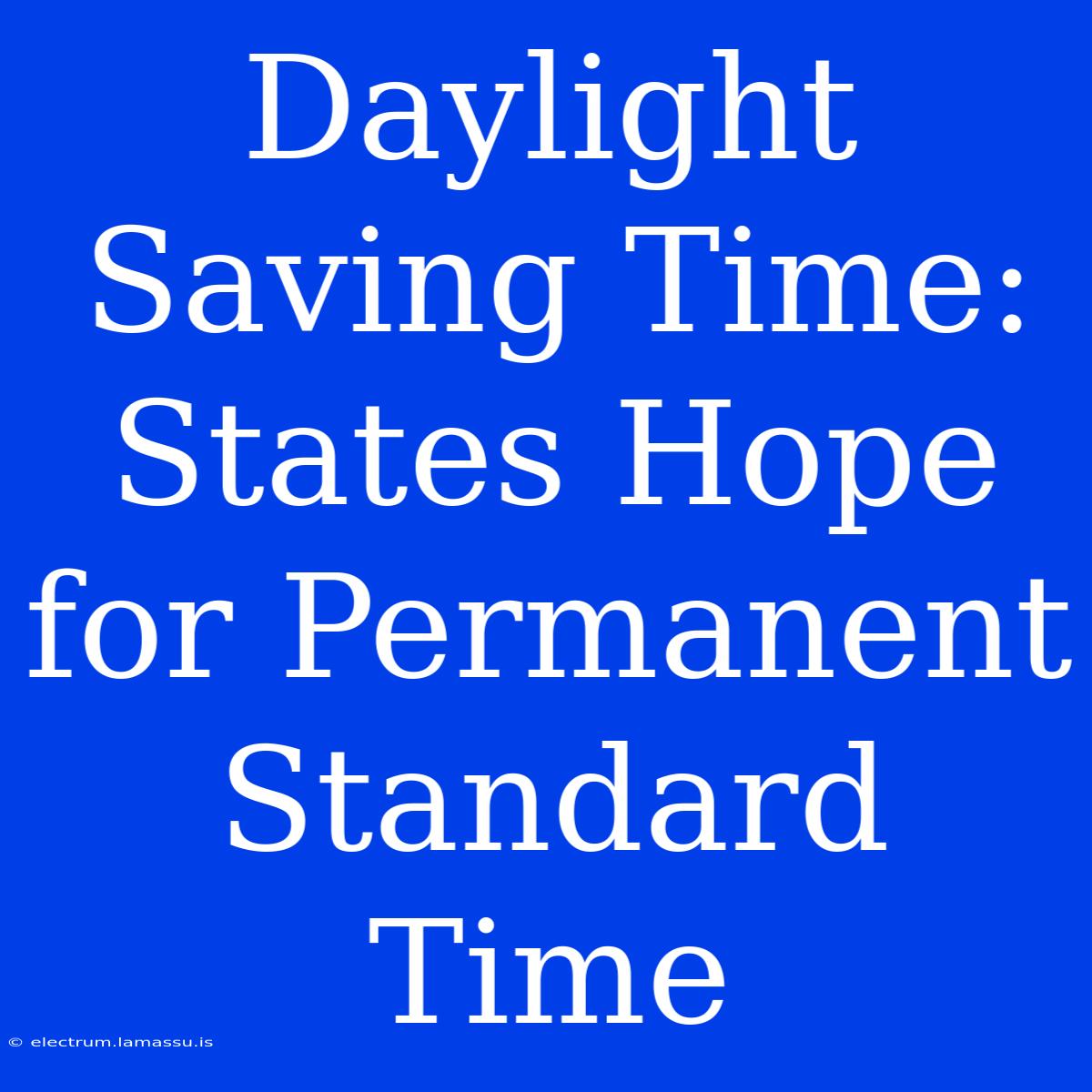Daylight Saving Time: States Hope for Permanent Standard Time
Does the annual "spring forward" and "fall back" of Daylight Saving Time (DST) make sense? Many states believe it does not, and they're actively pushing to make standard time permanent.
Editor Note: The debate surrounding Daylight Saving Time has been ongoing for years, with many states now considering permanent standard time. The implications of this change are significant, affecting everything from work schedules to energy consumption. This article delves into the arguments for and against permanent standard time, exploring the potential impact on different sectors.
This topic is important because Daylight Saving Time has been a subject of debate for decades. Some argue that it benefits public safety, reduces energy consumption, and boosts the economy, while others claim it disrupts sleep patterns, increases accidents, and negatively impacts health.
This article will explore the following:
- History and Purpose: Understanding the origin and initial intent of DST.
- Arguments for Permanent Standard Time: Examining the benefits of a consistent time throughout the year.
- Arguments against Permanent Standard Time: Analyzing potential drawbacks of switching to standard time permanently.
- States' Efforts and the Future of DST: Providing an overview of current legislative action and the potential trajectory of DST.
Analysis: We've conducted extensive research to understand the arguments on both sides of this complex issue. By examining scientific studies, policy analyses, and public opinion polls, we aim to provide a comprehensive analysis of the potential implications of permanent standard time.
Key Takeaways of Daylight Saving Time
| Aspect | Description |
|---|---|
| Purpose | Designed to save energy by shifting daylight hours later into the evening. |
| Benefits | Potential for reduced energy consumption, increased outdoor activity, and economic benefits. |
| Drawbacks | Disrupted sleep patterns, increased accident rates, and negative health implications. |
| States' Actions | Multiple states have proposed or enacted legislation to make standard time permanent. |
History and Purpose of Daylight Saving Time
Daylight Saving Time (DST) was first implemented in the United States during World War I as a wartime measure to conserve energy. The idea was to shift the clock forward by an hour during the summer months to take advantage of the longer daylight hours. This practice was revived during World War II and has been in place, with some variations, ever since.
Arguments for Permanent Standard Time
- Improved Sleep Patterns: A consistent sleep-wake cycle aligns with natural circadian rhythms, promoting better sleep and overall health.
- Increased Safety: Studies have shown a correlation between DST and increased accident rates, particularly car accidents.
- Reduced Energy Consumption: While some argue that DST saves energy, others believe that permanent standard time would be more energy-efficient by aligning with natural daylight patterns.
Arguments against Permanent Standard Time
- Economic Benefits: Some businesses argue that DST benefits them by extending daylight hours for commerce and recreation.
- Social Implications: Shifting to standard time could impact social activities, particularly during the summer months.
- Potential for Confusion: Switching back and forth between standard time and DST can be confusing for individuals and businesses.
States' Efforts and the Future of DST
Several states have passed or are considering legislation to make standard time permanent. However, the final decision rests with the federal government. The Uniform Time Act of 1966, which established DST as a national policy, would need to be amended to allow for permanent standard time.
FAQs about Daylight Saving Time
Q: Why do we have Daylight Saving Time?
A: DST was originally implemented during wartime to conserve energy by shifting daylight hours to the evening.
Q: What are the benefits of permanent standard time?
A: Proponents of permanent standard time cite potential benefits like improved sleep patterns, increased safety, and reduced energy consumption.
Q: What are the drawbacks of permanent standard time?
A: Opponents argue that DST benefits the economy, fosters social activities, and avoids confusion caused by switching between time zones.
Q: What is the current status of DST legislation?
A: Several states have either enacted or are considering legislation to make standard time permanent. However, the final decision rests with the federal government.
Tips for Adjusting to Daylight Saving Time
- Gradual Adjustment: Begin adjusting your sleep schedule a few days before the time change.
- Consistency: Maintain a consistent sleep-wake cycle, even on weekends.
- Sunlight Exposure: Get natural light exposure during the day to help regulate your circadian rhythm.
Conclusion
The debate surrounding Daylight Saving Time is multifaceted and complex. While some believe that DST benefits society, others argue that permanent standard time would be more advantageous for overall health, safety, and energy efficiency. As more states consider legislation to move to permanent standard time, the future of DST remains uncertain. The impact of these changes could be significant, affecting various aspects of our lives, from work schedules to daily routines. Ultimately, the decision on whether to retain or abolish DST will likely hinge on a careful consideration of the potential benefits and drawbacks of each option.

